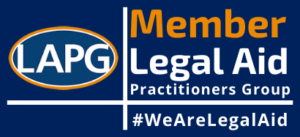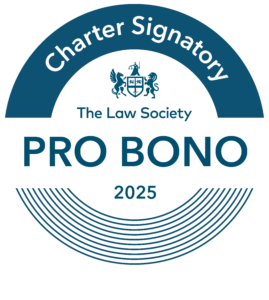Excluding Exclusion Zones – A Balancing of Rights
The exercise of balancing the rights of a victim of crime with a perpetrator of crime is a delicate subject. Our criminal justice system is, in part, rehabilitative. Offenders should be able to lead a normal life on release where possible. But victims of serious offences can raise legitimate concerns, especially regarding contact with offenders.
This is normally managed by exclusion zones, areas of the country where an offender is banned from visiting. But what happens when an offender has a legitimate reason to enter the exclusion zone proposed by the probation service?
The Case of AB
In a recent case parole I conducted, the rights of the victim conflicted with the rights of AB. I shall call the offender ‘AB’ to preserve the privacy of those involved.
The facts of AB’s Parole review were largely unrelated to the issues which then arose, following the hearing. AB had been convicted of a serious sexual offence and was subject to a life licence. The Parole Board directed AB’s release, for the first time, after almost two decades in custody.
Following the hearing, the Probation Service had made a particularly contentious request for an exclusion zone covering the majority of the AB’s home city. AB did not intend to live there but his family still did, as did the victim.
The Probation Service made three unsuccessful applications to have the exclusion zone included in the licence. Once at the hearing and two applications via a Stake Holder Response Form (SHRF) following the hearing. At the close of the hearing the Panel had indicated that the exclusion zone would be disproportionate.
The applications via SHRF were bare assertions that the exclusion zone was to protect the victim. At no point did the Probation Service make detailed submissions on the legal basis for the proposed exclusion zone. The sum of the argument was that the victim lived in the area and had asked for the exclusion zone.
Conversely, AB made detailed submissions that he had no intent to live within the exclusion zone, but did want to occasionally visit his family. It was argued that excluding AB from the city would unduly interfere with his ability to see his elderly mother.
The Human Rights Framework
As most practitioners will be aware, the framework governing lawful licence conditions is found in the European Convention on Human Rights. Specifically, at Article 8 which reads;
(1) Everyone has the right to respect for his private and family life, his home and his correspondence.
(2) There shall be no interference by a public authority with the exercise of this right except such as is in accordance with the law and is necessary in a democratic society in the interests of national security, public safety or the economic well-being of the country, for the prevention of disorder or crime, for the protection of health or morals, or for the protection of the rights and freedoms of others
By virtue of Article 8 ECHR any licence condition has to be both necessary and proportionate.
Generally, it is accepted that exclusion zones can be necessary to protect the victim. Minimising the risk of accidental contact between offender and victim is a good reason to impose an exclusion zone.[1] However, simply because a measure serves a public protection aim, it does not mean it is proportionate.
The Supreme Court considered the approach to a proportionality test in Bank Mellat. [2] It is summarised in Lord Reed’s dissenting opinion, affirmed by Lord Sumption’s lead opinion. Lord Reed suggests that in determining whether a restriction is proportionate, the questions which require answering are;
- whether the objective of the measure is sufficiently important to justify the limitation of a protected right,
- whether the measure is rationally connected to the objective,
- whether a less intrusive measure could have been used without unacceptably compromising the achievement of the objective, and
- whether, balancing the severity of the measure’s effects on the rights of the persons to whom it applies against the importance of the objective, to the extent that the measure will contribute to its achievement, the former outweighs the latter.
In short, the framework requires that a balancing exercise is undertaken. The purpose of an exclusion zone largely being the wellbeing of the victim, the Parole Board is required to undertake a balancing exercise of the competing positions.
Balancing the Rights of the Parties
So how did the Parole Board undertake this exercise in this case? Were the victim’s concerns about contact with AB sufficiently important to deprive him of contact with his family?
In short, no. AB’s arguments were successful. Ultimately, the failure to explain the need for the restriction, with reference to the Victim’s circumstances, was fatal to the proposed exclusion zone. There was simply inadequate evidence presented as to why the exclusion zone was necessary. Indeed, for a significant amount of time the Probation Service failed to mention that the Victim continued to reside in the area.
The Parole Board concluded that the passage of time and other restrictions prohibiting AB from seeking out or contacting the victim adequately managed the risk. The Probation Service had not justified why, other agreed exclusions being in place, it was proportionate to bar AB from visiting his family.
This is indicative of our wider experience in making representations as to the terms of an offender’s licence. The words ‘necessity’ and ‘proportionality’ are invariably referenced during parole hearings with little examination of what these terms mean in context. Frequently this is mitigated by the use of standard worded licence conditions in the Probation Instruction/PSI. However, some conditions, such as exclusion zones require careful examination in every case.
The Secretary of State almost always elects to be unrepresented at hearings before the Parole Board. It was no different on this occasion. The Probation Service, PPCS and Victim Liaison Services requested the exclusion zone but did not have the training to anchor this request within the legal framework.
When the Secretary of State has proposed contentious licence conditions, failing to justify them is remarkable. In the context of joining the Secretary of State to claims for judicial review, the Court has commented that “…the Secretary of State for Justice is the guardian of the public interest. The Public Protection Casework Section of the Ministry of Justice has valuable expertise in relation to both legal and practical aspects of Parole Board decision making.”[3] Arguably, by presenting licence conditions in a haphazard manner, this duty is not being discharged.
Killian Moran
Solicitor
Kesar & Co Solicitors
March 2021
[1]See for example R (on the application of Craven) v Secretary of State for the Home Department and another [2001] All ER(D) 74 (Oct) per Stanley Burnton J at § 36
[2] Bank Mellat v Her Majesty’s Treasury (No. 2) [2013] UKSC 39 per Lord Reed at § [74] & Lord Sumption at § [20]
[3] R (Davenport) v The Parole Board of England and Wales [2018] 1 WLR 2003 per Walker J at § [20]










Leave a Reply
Want to join the discussion?Feel free to contribute!